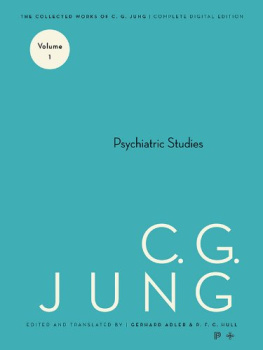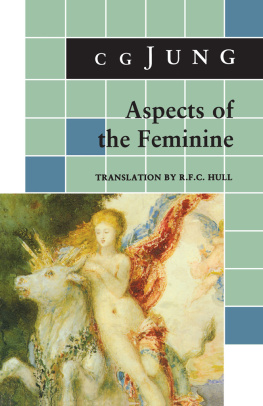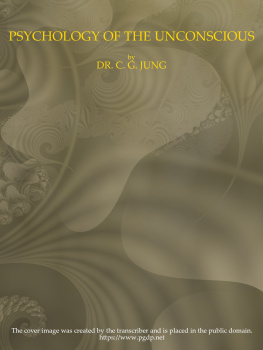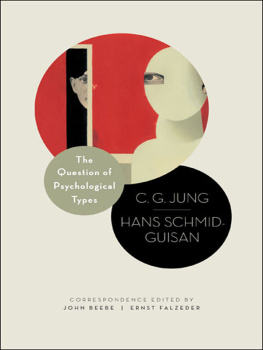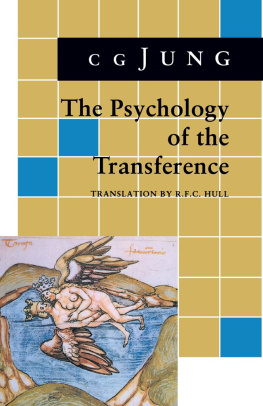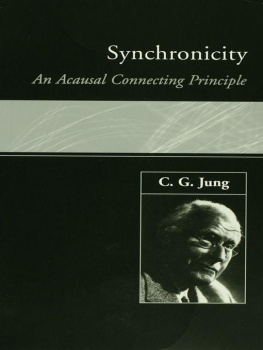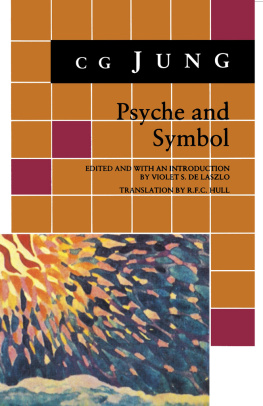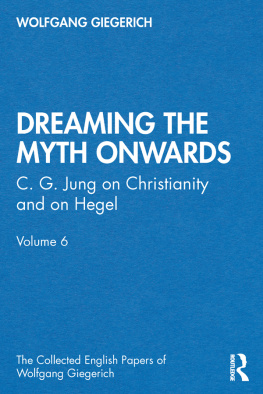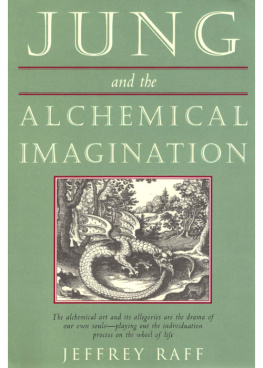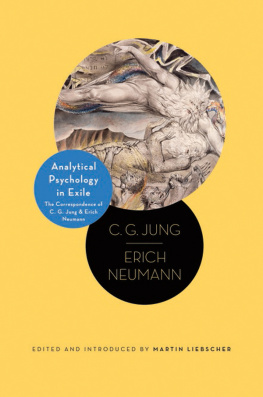JUNG
ON CHRISTIANITY
ENCOUNTERING
JUNG
JUNG ON ALCHEMY
JUNG ON EVIL
JUNG ON ACTIVE IMAGINATION
JUNG ON MYTHOLOGY
JUNG ON SYNCHRONICITY
AND THE PARANORMAL
JUNG ON CHRISTIANITY
ENCOUNTERING
JUNG
ON CHRISTIANITY
SELECTED AND INTRODUCED BY MURRAY STEIN

Introduction and Selection copyright 1999 by Princeton University Press
Published by Princeton University Press, 41 William Street,
Princeton, New Jersey 08540
All Rights Reserved
This book is composed of texts selected from the following volumes of the Collected Works of C. G. Jung: The Zofingia Lectures, Supplementary Volume A 1983 by Princeton University Press; The Symbolic Life, Volume 18, 1958 by Bollingen Foundation, renewed 1986 by Princeton University Press; Aion, Volume 9ii, 1959 by Bollingen Foundation, 2nd ed. 1969 by Princeton University Press, renewed 1987 by Princeton University Press; Psychology and Religion: West and East, Volume 11, 1958 by Bollingen Foundation, 2nd ed. 1969 by Princeton University Press, renewed 1986 by Princeton University Press; Psychology and Alchemy, Volume 12, 1953 by Bollingen Foundation, renewed 1981 by Princeton University Press; Alchemical Studies, Volume 13, 1967 by Bollingen Foundation; and Dream Analysis, 1984 by Princeton University Press. Other excerpts are taken from The Collected Letters of C. G. Jung, Volumes 2, 1953, 1955, 1961, 1963, 1968, 1971, 1972, 1974, 1975 by Princeton University Press; Memories, Dreams, Reflections, 1961, 1962, 1963, and renewed 1989, 1990, 1991 by Random House, Inc. (reprinted here by arrangement with Pantheon Books, a division of Random House, Inc.).
Jung, C. G. (Carl Gustav), 18751961.
On Christianity / selected and introduced by Murray Stein.
p. cm.(Encountering Jung)
Includes bibliographical references and index.
ISBN 0-691-00697-0 (pbk. : alk. paper)
1. ChristianityPsychology. I. Stein, Murray, 1943
II. Title. III. Series: Jung, C. G. (Carl Gustav), 18751961.
Selections. English. 1995.
BR110.J84 1999
230dc21 9928902
The paper used in this publication meets the minimum requirements of ANSI/NISO Z39.48-1992 (R1997) (Permanence of Paper)
http://pup.princeton.edu
Printed in the United States of America
10 9 8 7 6 5 4 3 2 1
CONTENTS
JUNG
ON CHRISTIANITY
INTRODUCTION
The arcane substance [of alchemy] corresponds to the Christian dominant, which was originally alive and present in consciousness but then sank into the unconscious and must now be restored in renewed form.
C. G. Jung (CW 14, par. 466)
In the passage quoted above, taken from the late work Mysterium Coniunctionis, Jung speaks as a religious man (a homo religiosus), and also as one for whom the central images of Christianity are a psychic reality that carries significant meaning. Often he writes about Christian themes in this way. He cares deeply about their value and importance, and he even proposes several important theological and practical revisions for Christianity. He speaks, however, as a psychologist and not as a Christian theologian or believer. This combination of factors, which characterizes Jungs approach to Christianity, has led to several general misunderstandings.
One major misinterpretation is that Jung was a Christian apologist, i.e., a defender of Christian truths within a contemporary setting using modern concepts and language. By some he has even been looked upon as a possible savior of Christianity in a time when its spiritual message is going unheard for want of persuasive images and concepts. His writings are taken at times as the words of a modern prophet. He is seen as a kind of evangelist in the garb of a medical psychologist.
Clearly this kind of evangelical persuasion was not Jungs intention, even if some of his writings give this impression. When he states (as above) that the Christian message must now be restored in renewed form, one might imagine him speaking in the voice of the Protestant Reformation but, given Jungs overall perspective and psychological program, this is a misreading. Unlike his Swiss countrymen, Karl Barth and Emil Brunner, two Protestant contemporaries who did consider the revitalization of Christian theology to be their mission, Jung does not place himself within the Christian theological circle. This would be presumptuous. He was trained as a medical doctor, not as a theologian. He was not out to serve the church, nor, like Paul Tillich, to correlate Christian answers to modern cultures questions. It is true that he expresses grave concern about a perceived lack of vitality in contemporary Christianity, but his focus lies not so much on the church as on modern people who are spiritually adrift and need living symbols to find meaning and direction in their lives. Also, unlike the theologians, Jung does not look to the Bible or to Christian tradition for authority or inspiration. Instead, he turns to the psyche and most particularly to the unconscious. This brings a wholly different dimension into play. To date, Christian theologians have not paid serious attention to the unconscious.
A second major misinterpretationprecisely the opposite of the firstis that Jung was anti-Christian and out to destroy Christianity or to supplant it with his own psychological theory, analytical psychology. This is as erroneous as it is to view him as a modern evangelist of Christianity. Jungs attachment to Christianity was indeed profound, and it ran stronger than a mere nod to Swiss conventionality. His commitment became increasingly evident in the latter years of his life. After his taxing journey to India in 1938 at the age of sixty-eight, Jung turned almost exclusively in his thinking and writing about religious matters to Westernspecifically to Christianthemes. He writes eloquently and with great sensitivity about religious rituals like the Roman Catholic mass (Transformation Symbolism in the Mass) and about Christian doctrines like the Holy Trinity (A Psychological Approach to Dogma of the Trinity). He also dwells deeply on the symbol of Christ and considers the meaning of Christianity for Western culture and humankind (Aion). In Answer to Job, he offers a stunning and highly controversial interpretation of the Bible. In all of these late texts, he speaks as a concerned psychologist. While he confesses ignorance of formal theology, he shows great awareness of theological issues and tackles some of the thorniest theological doctrines known to Christendom. These are not attacks upon Christian belief and practice, nor do they foresee their demise or suggest their replacement by analytical psychology. Clearly, Christianity meant a great deal to Jung. I believe that in later life it became for him something like an ultimate concern, to use Paul Tillichs phrase for the religious attitude.
Christianitys past and future were close to Jungs heart. He advocated the transformation of Christianity. This is significantly different from seeking to revitalize and reform it on the one hand or from abandoning or destroying it and supplanting it with psychology on the other.
Jungs relationship to Christianity was complex, though it is not impenetrable. Was Jung a Christian? This is a question many people have asked. There are many levels to consider in addressing this sensitive issue. If one uses the term Christian in a cultural sense and not in a more rigorous fashion that requires accepted denominational practices of belief and piety, the answer is yes. Officially Carl Jung was a Christian by virtue of his baptism, and he died a Christian, his remains being interred in the Swiss Protestant cemetery in the village of Ksnacht where he lived. In fact he was steeped in Protestantism. His grandfather, his father, and six of his uncles were pastors in the Swiss Reformed Church, and he grew up in a parsonage. He attended church as a child and received communion at the appropriate age. Habits of mind and attitude were importantly shaped by Swiss Protestant Christianity. Even as a youth, however, he showed tendencies toward free-thinking, and he could not accept the standard catechism answers to his theological questions. As an adult he did not attend church services regularly. His intellectual interests in religion ranged all over the mapfrom the Upanishads to Buddhist teachings, from Chinese Taoism to North American Indian nature worshipand he respected them all. With some justice, he has been seen as a harbinger of New Age spirituality, which also blends Eastern and Western (and other) traditions into numerous individual religious practices and notions. Yet he was highly critical of people who sever themselves from their historical religious roots and try to become practicing members of exotic foreign belief systems. Jung was a cultural conservative, if also a highly adventuresome and far-reaching intellectual explorer. He was a spiritually sensitive man who never left his native Christianity for another religion.


